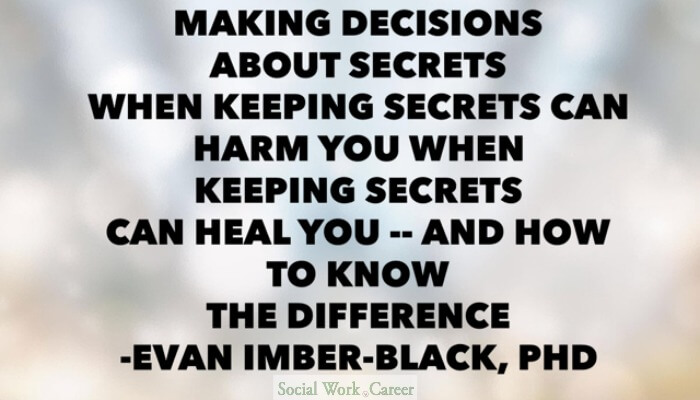 50 Shades of Secrets
50 Shades of Secrets
To tell or not to tell,
And if to tell, how to tell?
Secrets can be such a burden…
For example, one father shares his prognosis with his son,
Forging a closer bond between the two of them,
But keeps his wife and daughter out of the loop.
Son is left with a dilemma,
It doesn’t feel right for his mother and sister not to know,
But it is not his secret to share,
Son wants to be able to talk with mother and sister but,
Father insists on non-disclosure.
To tell or not to tell?
Evan Imber-Black distinguishes between three types of secrets:
Sweet secrets, essential secrets and toxic secrets.
Sweet secrets are fun,
They usually involve planning some sort of surprise,
Or buying a present for someone.
They are time-limited.
Essential secrets help define the boundaries,
To a relationship and are essential to well-being,
Such as a family having its own private language,
Loving words to indicate closeness or,
A couple with shared intimacies.
These tend to be of long-duration.
Toxic secrets can poison our relationships,
Certain family stories are shared only amongst select family members,
In an effort to “protect” remainder of the family in one way or another,
Some stories may be a month old,
Some may be passed on through generations,
There are so many problems with these…
Confidant has a burden to carry,
One that may increase with time,
As more information inevitably gets added,
To the original requested secret,
He/she is cut off from rest of family,
May be reeling from pain to reveal…
Also, please take note that,
Family members who do not “know,”
May unconsciously know more than you think,
Often times, one member may end up acting out the secret…
That was so bad, that shouldn’t be mentioned,
Making the family hesitate all the more.
Would you like an example?
In one family, there was a grandmother,
Who once long ago had attempted suicide,
This was kept hush, hush,
A grandson was born but the secret was never told,
Before the grandson reached adulthood, he too attempted suicide…
But he did not know the story of his grandmother,
His family never told him,
Do you think they told him after his attempt?
No, his family was even more frightened to share with him,
The truth about his grandmother,
Was this the correct decision?
Sadly, Imber-Black cites many similar examples,
Holding onto toxic secrets has a price,
This is not to say that all secrets should be revealed,
Not at all, there are 50 shades of secrets, all types of consequences,
However, there are some that it may be beneficial to open…
As long as done thoughtfully and judiciously.
What are your thoughts about secrets? Have you been at times torn about holding a particular secret? What criteria would you use to help a client decide on whether to disclose a secret?
Reference:
E. Imber-Black (1998). The secret life of families. Bantam Books, New York. [Affiliate link]



Hi Dorlee- I’ve read this book and have met the author…Excellent book to read about secrets in the family that can pass down through the generations. Secrets are a terrible thing in any family and when brought out in the open can start the healing process. Very tricky though and getting help to work through it is so important.
Hi Sharon,
Thank you for your thoughtful comment. I’m still in the first half of the book but I’m finding it fascinating.
How exciting that you met the author! When/how did you have this opportunity?
I can see how bringing out secrets may start the healing process but I can also envision how they may create mayhem when they first come out…
I have never seen toxic secrets as described here, ever successfully, protectively kept – and when they do emerge, the effects are far more explosive and destructive than the disturbing truth would have been at the appropriate time.
We see these issues emerging in the adoption community constantly, adult adoptees uncover information, kept from them by parents or by adoption agencies, that when it does emerge, it carries extraordinary resentment from the dishonesty that attends the secret.
Secrets are different from privacy. Privacy is to set boundaries and guard our own wounds. Privacy is a consciously stated boundary. “I would prefer not to talk about that because that feels personal and private to me and is very difficult for me to speak of” is very different than negating other people’s perceptions: “Everything is fine!”- such secrets are crazy making because they undermines other’s intuition and instincts.
Privacy is claimed explicitly and openly. Secrecy is hidden.
One other brief caveat: for children, it’s important that difficult information be truthful, but age-appropriate – Kids are quite good at dropping the subject or getting distracted when they have heard enough – and to press past their defenses to offer up the whole truth at one fell swoop is burdensome and overwhelming. Kids often need to take a piece in at a time, and, respecting that is also different from “keeping a secret.”
Thanks for a lovely post on an interesting subject!
Martha,
I’m so appreciative of the valuable insights and distinctions you shared regarding secrets and privacy.
This whole area is so very tricky; hence, the need to often consult with a therapist or a wise trusted advisor about the when/how (or if) of disclosure.
Also, many thanks for your kind feedback 🙂